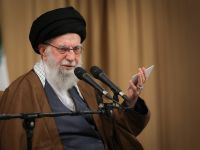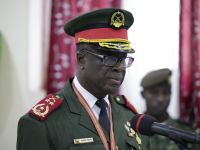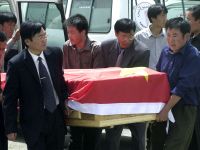U.S. President Bush warned Iraq on Saturday that any act of delay or defiance would be a breach of its international obligations under a tough new U.N. resolution requiring Baghdad to disarm.
He said if Iraqi President Saddam Hussein failed to allow immediate and unrestricted access to every site, every document and every person identified by U.N. weapons inspectors, it would be a clear signal of noncompliance.
"The world has now come together to say that the outlaw regime in Iraq will not be permitted to build or possess chemical, biological or nuclear weapons," Bush said in his weekly radio address. "And my administration will see to it that the world's judgement is enforced."
Bush made clear he would not accept any stalling from the Iraqi government. "Iraq must now, without delay or negotiations, give up its weapons of mass destruction, welcome full inspections and fundamentally change the approach it has taken for more than a decade," he said. "Iraq can be certain that the old game of cheat and retreat, tolerated at other times, will no longer be tolerated."
The UN Security Council Friday gave Iraq a seven-day ultimatum to agree to a powerfully enhanced weapons inspection regime, warning it of "serious consequences" if it failed to disarm.
The official Iraqi News Agency on Saturday said Iraq's leaders were studying the "bad and unjust" resolution and are inclined to respond in the "next few days."
A cautiously worded statement from the Arab League in Cairo said it "respected" Security Council resolutions.
"The repercussions of this resolution and the means of reacting to it will be discussed during the Arab foreign ministers' meetings on Saturday and Sunday" in Cairo, League spokesman Hisham Yussef said.
The 15-member council voted unanimously for the US-drafted Resolution 1441, giving the inspectors enhanced powers including the right to "immediate and unimpeded access" to Saddam's palaces.
The unanimous vote surprised diplomats who had expected Syria, the only Arab member of the council, to abstain. Syria's deputy U.N. Ambassador Fayssal Mekdad said Damascus voted "yes" after assurances from Washington and Paris "that this resolution would not be used as a pretext to strike Iraq." The resolution also reaffirmed "the central role of the Security Council" and Iraq's sovereignty, key issues for Syria, he said.
Iraq has seven days to agree to comply with the resolution, which demands that it destroy its weapons of mass destruction.
Iraq has a further 23 days to make a currently accurate, full and complete declaration of its programs to develop chemical, biological, and nuclear weapons and ballistic missiles.
False statements or omissions, together with a failure to cooperate, would constitute "further material breach" of Iraq's obligations.
"The clock is ticking right now," a senior US official said, according to AFP. "The government of Iraq has a pretty fundamental choice to make. If they make the wrong choice it will be evident early on."
On his part, US Secretary of State Colin Powell has hinted that Washington would stop calling for a change of regime in Baghdad if Iraq decided to get rid of its weapons of mass destruction and cooperated fully with the UN arms inspectors.
"If the Iraqi regime got rid of these weapons of mass destruction and were fully cooperating with the inspectors, then, in effect, it has changed its policies; it is a changed regime," Powell said late Friday in an interview on Qatar's Al Jazeera satellite television channel.
"The reason for regime change in the beginning, in 1998, under the previous American presidential administration, was because Iraq would not disarm, it would not comply with the resolutions," Powell went on.
"If it complies with those disarmament resolutions, in effect, it has adopted new policies, which suggest a change in the thinking in Baghdad and a changed regime."
The secretary of state stressed however that his country reserved the right to act against Iraq if it violated Security Council Resolution 1441. "The United States retains its option to act if the Security Council doesn't act," he declared.
Powell said the vote Friday "shows that the international community is unified" in its position on Iraq. "What we succeeded in doing is getting all 15 members of the Security Council together behind a single resolution," he said after recalling that "we worked very closely with the French and the Russians and all of the other members of the Security Council in reconciling different points of view and different positions that were held." (Albawaba.com)
© 2002 Al Bawaba (www.albawaba.com)







